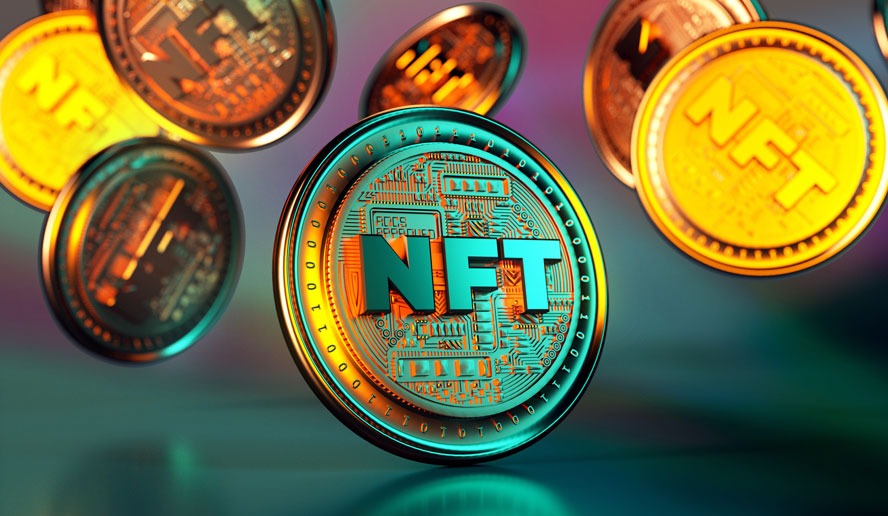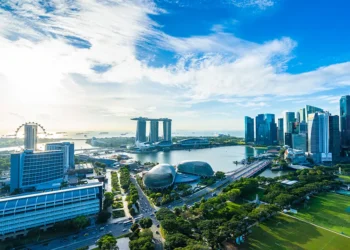In Part 1 of this two-part series, we looked at the rising world of metaverses and NFTs. In Part 2 we take a closer look at how integrated resort and casino operators can drive real-world visitation.
 Metaverse platforms allow brands and organizations to create a virtual representation of their stores, destinations and facilities, and to interact with customers and users within that space. Companies including Adidas, Gucci, Samsung, Atari, HSBC and South China Morning Post have already acquired virtual land plots and are constructing their presence within the platforms.
Metaverse platforms allow brands and organizations to create a virtual representation of their stores, destinations and facilities, and to interact with customers and users within that space. Companies including Adidas, Gucci, Samsung, Atari, HSBC and South China Morning Post have already acquired virtual land plots and are constructing their presence within the platforms.
 For the IR industry, the concept is especially appealing as a destination marketing tool to showcase the resorts’ unique features, design and facilities both to individual consumers and travel agents, for pre-trip marketing, engagement and sales.
For the IR industry, the concept is especially appealing as a destination marketing tool to showcase the resorts’ unique features, design and facilities both to individual consumers and travel agents, for pre-trip marketing, engagement and sales.
One company to realize the potential is Asia Pioneer Entertainment Holdings Limited, which has developed a virtual model of Macau in The Sandbox metaverse. APE’s “Mini-Macau” presents a digital representation of the main historic sites and tourist attractions in the city, including the Ruins of St Paul, A-Ma Temple, Senado Square and Macau Tower, to cultivate interest in Macau as a tourist destination among The Sandbox’s users. To promote user engagement, APE has embedded a series of themed, in-world virtual games which have been created in collaboration with well-known Macau brands to showcase local products and specialties. Metaverse users can play the games to win QR codes which can be redeemed for physical prizes at APE Smart vending machines in Macau.
 For IR operators, the advantages of an online-to-offline customer engagement tool which could drive trips to Macau and specific resort locations presents a compelling proposition. APE’s “Mini-Macau” is a prototype for the company’s own future metaverse platform projects, “Resortsverse”, which contemplates a digital representation of prospective IR partners’ properties, combined with gamification and tokenization. The rewards mechanism of Resortsverse encompasses blockchain-based loyalty tokens that are redeemed for travel coupons on-property, such as attraction tickets, meal vouchers or room nights.
For IR operators, the advantages of an online-to-offline customer engagement tool which could drive trips to Macau and specific resort locations presents a compelling proposition. APE’s “Mini-Macau” is a prototype for the company’s own future metaverse platform projects, “Resortsverse”, which contemplates a digital representation of prospective IR partners’ properties, combined with gamification and tokenization. The rewards mechanism of Resortsverse encompasses blockchain-based loyalty tokens that are redeemed for travel coupons on-property, such as attraction tickets, meal vouchers or room nights.
 The metaverse activities and rewards will strictly focus on non-gaming functions due to regulatory considerations, which exert a key influence on the development of these metaverses. Although metaverse-specific laws have yet to emerge that relate to the construction and activities in the metaverse, existing gaming laws, e-commerce laws, consumer protection and data privacy regulations apply equally to the business operations of these virtual platforms, to the same extent as to the activities of online websites, apps and social media channels.
The metaverse activities and rewards will strictly focus on non-gaming functions due to regulatory considerations, which exert a key influence on the development of these metaverses. Although metaverse-specific laws have yet to emerge that relate to the construction and activities in the metaverse, existing gaming laws, e-commerce laws, consumer protection and data privacy regulations apply equally to the business operations of these virtual platforms, to the same extent as to the activities of online websites, apps and social media channels.
A core issue, therefore, is legal jurisdiction, to identify which laws apply to a particular metaverse. The principles used to determine the jurisdiction of laws over existing apps, websites and social media channels will likely serve as a guideline for metaverse platforms. Hence, factors such as the locations of the metaverse platform operator, of servers and processing of data, of target users, and languages used in the metaverse, will contribute to the jurisdictional assessment and determination of the respective laws that will apply. For instance, in the case of a Hong Kong-based metaverse developer which sells a virtual land plot to a Macau-based brand, and has metaverse users located in Singapore, Japan and Korea, there will be a number of relevant laws across these jurisdictions that could apply, including sale of goods and services laws, consumer protection laws and personal data and privacy laws.
Gaming activities in the metaverse will therefore fall under the ambit of existing jurisdictional gaming laws and will be subject to licensing requirements in permitted territories. Essentially, metaverse platforms offer an alternative channel for licenced online gaming operators, but do not allow for unlicenced gaming activities conducted by unregulated parties. Consequently, leading online gaming jurisdictions such as Malta, Gibraltar and Isle of Man, may see an increase in license applications from businesses intending to construct virtual casinos in metaverses tied to these jurisdictions.
 LOYALTY CRM ECOSYSTEMS
LOYALTY CRM ECOSYSTEMS
Although the immediate presence of Macau-based IR operators in the metaverse will likely comprise of purely non-gaming facilities, at the same time the opportunity arises to engage and reward known customers in the virtual space with points or coupons that could be redeemed on-property at various locations. IR-dedicated metaverses could therefore become a more sophisticated CRM and loyalty ecosystem, able to track and reward individuals’ online engagement in-market and accredit the individuals when they visit the physical resort. Systems convergence between individuals’ metaverse profiles and on-property memberships will be fundamental to maximize the potential for loyalty analysis and engagement.
A critical aspect of the integration is KYC, to allow for accurate identity authentication of the digital profile with the customer’s in-person account. AXES, the global cloud information management platform for the gaming industry, is centering on digital ID customization solutions. These use digital identity validation technology to confirm that the digital identity of online users matches the real-world identity of customers and to eliminate fraudulent bad actors, thereby allowing clients to have a more secure and authenticated convergence between digital and on-property customer profiles and subsequent engagement.
 NFTS AND DIGITAL COLLECTIBLES AS ENGAGEMENT TOOLS
NFTS AND DIGITAL COLLECTIBLES AS ENGAGEMENT TOOLS
While many of the metaverses are still in the production environment or Beta testing, NFTs or digital collectibles have become mainstream features of consumer brands’ digital marketing strategies over the past year. Fundamentally, two types of NFTs or digital collectibles have emerged.
The first type has dominated the media headlines, with inherently high values due to the perceived scarcity and demand for the attaching assets, which usually consist of a digital artwork jpeg or gif. Such NFTs have sold for the equivalent of millions of dollars in cryptocurrencies at auctions and on the main NFT marketplaces.
The second type are known as digital collectibles and are sold, or given away, by brands or organizations as marketing tools for user engagement at minimal prices, sometimes paid for in fiat currency.
Once again, regulation and policy factors have heavily influenced the development of NFTs and digital collectibles with notable regional divergence in the Asia market. In China, the People’s Bank of China has restated the prohibition on cryptocurrencies and all associated activities, resulting in payment and valuation of digital collectibles solely in fiat RMB currency. As a consequence, digital collectibles are mostly issued on alliance blockchains, like that of Ant Group’s AntChain, Tencent’s Zhixin, or the Government backed Blockchain-based Service Network, and not using public decentralized blockchains.
In April 2022, the China Banking Association, China Internet Finance Association, and Securities Association of China issued a joint statement about the risks of investing in NFTs and clarified that NFTs should not be considered as securities or other financial products. The directive prohibits financial investment in NFTs, or providing financial support to others for investment purposes, and also forbids fractionalized ownership of NFTs and settlement of NFT transactions using cryptocurrencies.
As a consequence, digital collectibles with no intrinsic value will remain the only viable option for the China market for use as marketing or promotional tools. By way of example, Alibaba released a collection of digital collectible mooncakes for Mid-Autumn Festival last year that were built on Ant Group’s AntChain and sold through Taobao for RMB1 each. It is clear that the China market will not support the use of NFTs as pseudo-investment products for financial investment and speculation. To this end, the major digital collectible marketplaces in China have introduced requirements for purchasers to hold digital collectibles for a minimum of 180 days before transferring or reselling to avoid any type of short-term trading for profit.
 Outside the China market, NFT ownership has also been trialled as a tool to increase customer attachment to brands and long-term customer loyalty. Luxury brands, in particular, have started to use NFT ownership communities as new VIP CRM programs. Access to these exclusive NFT communities is reserved for VIP customers who buy one of the specified NFTs in the series, which also serve as tiered memberships and come with a range of brand-based benefits for owners, such as access to exclusive digital and physical apparel drops, and invitations to digital and in-person events.
Outside the China market, NFT ownership has also been trialled as a tool to increase customer attachment to brands and long-term customer loyalty. Luxury brands, in particular, have started to use NFT ownership communities as new VIP CRM programs. Access to these exclusive NFT communities is reserved for VIP customers who buy one of the specified NFTs in the series, which also serve as tiered memberships and come with a range of brand-based benefits for owners, such as access to exclusive digital and physical apparel drops, and invitations to digital and in-person events.
Digital collectibles and NFTs offer a number of potential use cases to the IR industry for customer engagement. Leading the way, Asia Pioneer Entertainment has created its first NFT artwork collection, Asia Tiger NFTs, a series of dynamic hand-drawn Chinese ink art pieces that were produced in collaboration with the Portuguese artist Pedro Lourenço, and digitalized on the Ethereum blockchain. One of the rewards for collectors of Asia Tigers Club NFTs will be priority access to APE’s own metaverse platform, “Resortverse”. There, collectors will be able to play games created within the Resortsverse platform and receive exclusive offers and early bird invitations to APE’s events and webinars.
The NFT collection underlines the potential use of NFTs or digital collectibles as a new mechanism to acquire and reward new customers, especially among the younger digital-native generation.
 RELEVANT METAVERSE FOR THE TARGET AUDIENCE
RELEVANT METAVERSE FOR THE TARGET AUDIENCE
With regulation and policy factors causing jurisdictional differences in the development of metaverse platforms, digital collectibles and NFTs, it is crucial for operators to establish their presence in the metaverse ecosystems which their target market can access and interact with. Ease of use and user experience will ultimately determine which metaverse platforms become most popular and acquire most users, which is critical for long-term sustainability and survival among the thousands of metaverses that are under development.
![]() The potential use cases of the metaverse for IR operators appear compelling: as destination marketing tools to showcase resort features and facilities in the virtual space and as online-to-offline loyalty engagement mechanisms, especially at a time when in- person visitations continue to be affected by cross-border travel conditions. Moreover, these non-gaming metaverse platforms may present an outlet for Macau gaming concessionaires to evidence their development of more diversified, tourism-orientated activities that promote Macau as a visitor destination, which are likely to form a central pillar of concessionaires’ submissions in the upcoming Macau gaming license tender process.
The potential use cases of the metaverse for IR operators appear compelling: as destination marketing tools to showcase resort features and facilities in the virtual space and as online-to-offline loyalty engagement mechanisms, especially at a time when in- person visitations continue to be affected by cross-border travel conditions. Moreover, these non-gaming metaverse platforms may present an outlet for Macau gaming concessionaires to evidence their development of more diversified, tourism-orientated activities that promote Macau as a visitor destination, which are likely to form a central pillar of concessionaires’ submissions in the upcoming Macau gaming license tender process.





























